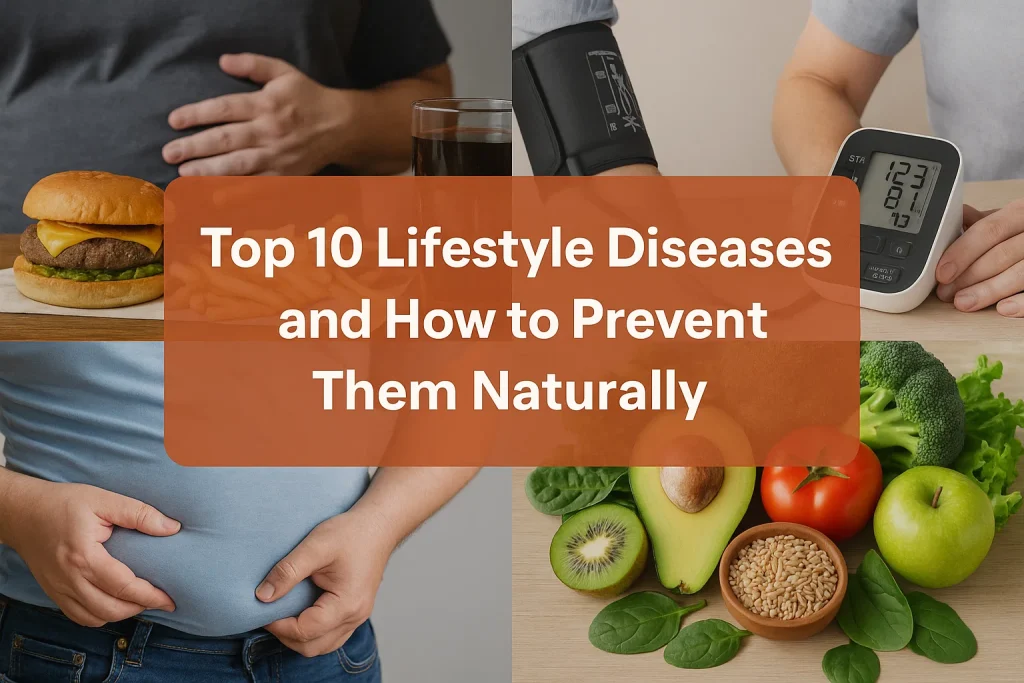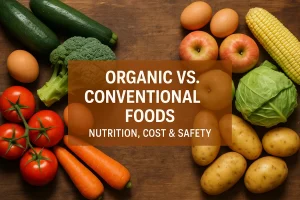
Top 10 Lifestyle Diseases and How to Prevent Them Naturally
Modern lifestyles have contributed to the rise in the number of chronic health conditions in today’s fast-paced world. These are known as lifestyle diseases, and they are often preventable. Stress, lack of sleep, poor diet, and sedentary behavior are major causes. In this article, we’ll explore the top 10 lifestyle diseases and natural, evidence-based ways to prevent them.
What are Lifestyle diseases?
Lifestyle diseases are health conditions primarily caused by poor daily habits, such as Poor eating habits, lack of exercise, stress, smoking, and excessive drinking. Unlike infectious diseases, these aren’t spread from person to person. Instead, they gradually develop over time, often going undetected until they become serious.
What are lifestyle disease risk factors and causes?
The most prevalent risk factors linked to lifestyle-related illnesses include
- Inactive lifestyle
- Poor eating habits (trans fats, sugar, and processed foods)
- Smoking and alcohol abuse
- Chronic stress and Lack of sleep
- Environmental pollutants and screen time
How do Lifestyle diseases impact Global Health?
According to the WHO (World Health Organization), lifestyle diseases make up about 68-71% of all deaths worldwide, with heart disease, diabetes, and cancer being the leading causes. These conditions not only impact quality of life but also result in long-term healthcare expenses.
1. Type 2 Diabetes: Often starting silently, it occurs due to high blood sugar levels when insulin is not produced in sufficient amounts.
Symptoms and Long-Term Effects
Type 2 Diabetes symptoms include
- frequent urination,
- Fatigue,
- blurred vision
- slow healing.
Long-term, it can lead to nerve damage, kidney failure, and blindness.
How to control Type 2 Diabetes at home?
- Consume low-glycemic foods such as oatmeal, lentils, and leafy greens.
- Exercise for at least 30 minutes daily.
- Keep your weight in check.
- Engage in short-term fasting as per your doctor’s advice.
- Use natural supplements such as fenugreek and cinnamon.
Note: Always consult a doctor before trying short-term fasting or using natural supplements.
2. Cardiovascular Diseases: These include heart attacks, strokes, and arrhythmias
Warning Signs
The following are warning signs of cardiovascular diseases:
- Fatigue
- chest pain
- shortness of breath
- irregular heartbeat.
What are the best natural ways to keep your heart healthy?
Cardiovascular disease can be managed through a well-balanced, healthy-heart diet. These are:
- Go for a Mediterranean diet (including fruit and vegetables, whole grains, a low-dairy diet, and seafood).
- Consume omega-3s (chia seeds, flaxseed)
- Manage stress through meditation.
- Stay away from sugar and trans fats.
- Get routine cardiovascular examinations.
3. Obesity: Being obese affects mental health and self-esteem in addition to raising the risk of several diseases, such as diabetes, cancer, and heart issues.
How to control obesity through lifestyle changes?
- Eat smaller portions and pay attention while eating.
- Cut out processed and sugary foods.
- Use the stairs, enjoy a short walk after meals, and stretch regularly.
- Increase water intake and cut back on soda.
- Get quality sleep (7-9 Hours at night)
4. Hypertension (High Blood Pressure): When blood pressure stays above 130/80 mmHg, it can lead to hypertension, or High Blood pressure. Usually asymptomatic, it’s also called the “silent killer.”
How to control High BP (Blood pressure) naturally?
- Eat foods that are high in potassium, such as spinach and bananas.
- Cut back on caffeine and salt.
- Go for flaxseed, hibiscus tea, and garlic.
- Practice daily breathing exercises or yoga.
- Quit smoking and limit alcohol intake
5. Chronic respiratory diseases: They include conditions that can harm the lungs and make breathing difficult, such as asthma and Chronic Obstructive Pulmonary Disease (COPD). Pollution, smoking, and allergens are all potential triggers.
How can I prevent COPD at home?
- Keep your home clean and well-ventilated to avoid air pollution and allergens.
- Don’t smoke, as it can affect alveoli, leading to inflammation and conditions like bronchitis.
- Practice breathing exercises like pranayama.
- Use herbal remedies like tulsi, ginger, and honey, and anti-inflammatory foods like turmeric. (under medical advice)
6. Liver Disease: Fatty Liver and Non-Alcoholic Fatty Liver Disease (NAFLD) are becoming more common as a result of unhealthy lifestyles and poor eating habits, such as high-fat diets, excessive alcohol consumption, and obesity.
How to detox the liver naturally?
- Reduce alcohol intake or quit completely, as it has a direct impact on the liver.
- Avoid excess sugar and processed foods containing fructose.
- Consume liver-supportive foods like garlic, turmeric, beets, and green tea.
- Exercise regularly to reduce liver fat.
7. Cancer: Many cancers are associated with diet, alcohol, tobacco use, and inactivity, such as colon, breast, and liver cancer.
How can you lower the risk of lifestyle-related cancers?
Here are some cancer prevention tips.
- Include antioxidant-rich foods like berries, green tea, and cruciferous vegetables.
- Avoid processed meat.
- Use sunscreen to avoid UV exposure (linked to skin cancer like melanoma).
- Maintain a healthy body weight.
- Go for regular screening and do self-exams.
8. Depression and Anxiety: Bad lifestyle habits such as poor diet, excessive screen time, Lack of social support, and chronic stress can all impact our overall mental health.
Natural Prevention Tips:
- Be thankful each day and practice calm breathing or meditation.
- Maintain social connections and talk about your feelings.
- Limit caffeine and sugar.
- Eat food rich in omega-3s, B vitamins, and magnesium.
- Reduce your screen time and engage in outdoor activities or hobbies.
9. Osteoporosis: Over time, bones become weaker due to a lack of movement, calcium, and vitamin D.
Top Natural Ways to Strengthen Your Bones
- Exercises involving weight bearing, like walking.
- Consume foods high in calcium, such as ragi, milk, curd, and sesame seeds.
- Get daily sunlight to boost vitamin D levels.
- Quit smoking and drink less soda.
- Use bone-friendly herbs like horsetail.
10. Polycystic Ovary Syndrome (PCOS): Common in young women with poor diets and sedentary lifestyles.
How to control PCOS?
- Consume a diet high in whole foods and low in carbohydrates and fiber.
- Exercise every day, such as HIIT or resistance training, to stay active.
- Manage stress naturally through yoga, meditation, or journaling.
- Limit your exposure to endocrine disruptors by staying away from plastics and cosmetics that contain chemicals.
Simple Natural Ways to Prevent Lifestyle Diseases
Lifestyle diseases are rising due to unhealthy habits and stress. Simple natural changes in diet, exercise, and routine can help prevent them.
- Eat Quality Food: Improve your diet by consuming unprocessed, whole, seasonal foods over packaged ones. Include a variety of colors on your plate.
- Keep Yourself Active: You don’t need a gym—walking, yoga, dancing, or even gardening helps improve your health.
- Keep yourself Hydrated: Make sure to drink 2-3 liters of water per day. Herbal teas like tulsi or ginger can offer added benefits.
- Get quality Sleep: Sleep 7–8 hours nightly. A regular sleep schedule can improve immunity and metabolism.
- Manage your stress: Use techniques like journaling, music therapy, or spending time in nature.
- Routine Health Checkups: Catch warning signs early with regular screenings for blood pressure, sugar levels, cholesterol, and cancer markers.
Final Thoughts
The majority of lifestyle diseases, including high blood pressure, diabetes, heart disease, and obesity, can be avoided with the correct strategy. Adopting natural and holistic habits can significantly reduce your risk while also improving your overall health. Focus on eating a well-balanced, whole-food diet, staying physically active, sleeping for 7-8 hours per day, and managing stress with mindfulness or yoga. Making small decisions each day is the first step toward prevention. Make a natural commitment to a healthier, happier life by starting small and staying consistent.
Top 10 Lifestyle Diseases—Stats Overview
| Lifestyle Disease | Stats (India / Global) | Major Causes | Key Effects |
| Cardiovascular Diseases (CVD) include heart disease & stroke | Global: ~19 million deaths annually (WHO) India: Leading cause of death; rising among young adults | High BP, cholesterol, smoking, diabetes, poor diet, stress | Heart attack, stroke, heart failure, disability, early death |
| Type 2 Diabetes | Global: 537M (2021), projected 783M by 2045. India: 101M diagnosed, 136M pre-diabetic | Obesity, high sugar diet, inactivity, stress, genetics | Kidney damage, vision loss, nerve damage, heart risk |
| Cancers (Lifestyle-linked) | Global: ~10 million deaths/year India: Rise in breast, oral, and colorectal cancers | Smoking, alcohol, poor diet, inactivity, infections (e.g., HPV), pollution | Organ failure, fatigue, pain, and early death |
| Chronic Respiratory Diseases: Asthma, COPD | Global: 4.1 million deaths/year, India: ~55 million COPD cases; rising asthma due to pollution | Smoking, air pollution, allergens, and occupational dust | Lung damage, chronic cough, breathlessness, and disability |
| Obesity | Global: 1B obese, 2.5B overweight. India: 135M obese; urban surge | Processed food, sugary drinks, inactivity, stress, and sleep loss | Diabetes, CVD, PCOS, joint pain, sleep apnea, mental health issues |
| Hypertension (High BP) | Global: 1.28 billion (WHO, 2019) India: ~220 million affected | High sodium diet, obesity, stress, alcohol, and poor sleep | Stroke, heart disease, kidney damage, vision loss |
| Depression & Anxiety Disorders | Global: ~280M with depression, 301M with anxiety India: 50M+ affected (NIMHANS) | Chronic stress, isolation, poor sleep, low activity | Poor focus, low productivity, risk of suicide, worsening of other diseases |
| Liver Disease (NAFLD / MASLD) | Global: Affects ~25–30% of adults. India: 1 in 3 urban adults affected | High-fat/sugar diet, obesity, insulin resistance, alcohol | Fatty liver, NASH, cirrhosis, liver failure, cancer risk |
| Chronic Kidney Disease (CKD) | Global: ~850 million people. India: ~17% have early-stage CKD | Diabetes, high BP, painkillers, dehydration, and obesity | Kidney failure, dialysis, heart complications, anemia |
| Polycystic Ovary Syndrome (PCOS) | Global: Affects 8–13% of women. India: 1 in 5 women affected | Insulin resistance, obesity, genetics, poor diet, stress | Irregular periods, infertility, acne, weight gain, and diabetes risk |
Top Key Facts about Lifestyle Diseases:
- Heart disease is still the leading cause of death worldwide and in India, and it is fueled by unhealthy lifestyle choices (WHO, 2021).
- According to ICMR-INDIAB (2023), 136 million Indians are pre-diabetic, and 101 million have type 2 diabetes.
- Obesity affects around 135 million Indians, significantly raising their risk of developing various illnesses (ICMR, 2023)
- Approximately 1 in 5 women (20%) of Indian women suffer from PCOS, influenced by genetics and lifestyle factors (ICMR, 2023).
- Smoking, poor diet, and UV exposure are among the unhealthy lifestyle choices that are linked to 30–40% of cancers (WHO, 2023).
FAQs
Can lifestyle diseases be reversed naturally?
Yes, diet, exercise, and lifestyle changes can reverse or manage several conditions, including obesity, fatty liver, and type 2 diabetes.
What foods are best for preventing lifestyle diseases?
Antioxidant-rich foods, fruits, vegetables, whole grains, nuts, seeds, and legumes, all reduce inflammation and disease risk.
How much exercise is needed?
Aim for 150 minutes of moderate activity or 75 minutes of intense activity each week, in addition to twice-weekly muscle-strengthening activities.
How do lifestyle diseases relate to stress?
Chronic stress causes weight gain, inflammation, hormonal imbalance, and poor sleep, all of which are factors in the development of disease.
Are supplements necessary for prevention?
Your main source of nutrients should be whole foods; otherwise, you can take natural supplements like vitamin D, magnesium, or omega-3, which may be helpful.
- Is Curd Good for Weight Loss? Benefits, Myths & How to Eat It Right
- Why Cancer Is Rising in India: 15 Hidden Factors You Should Know







